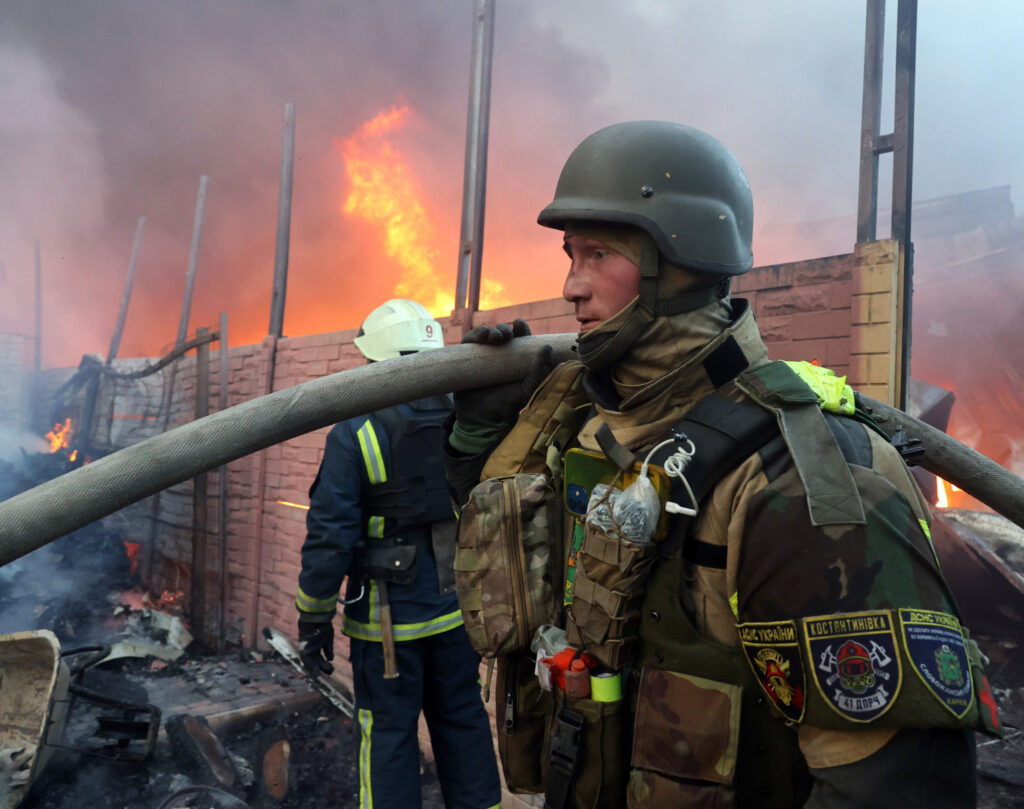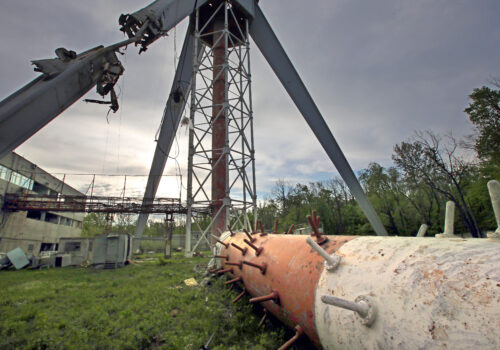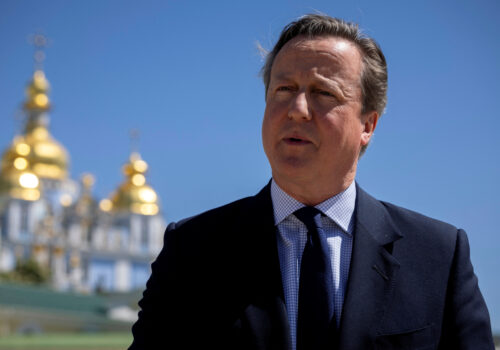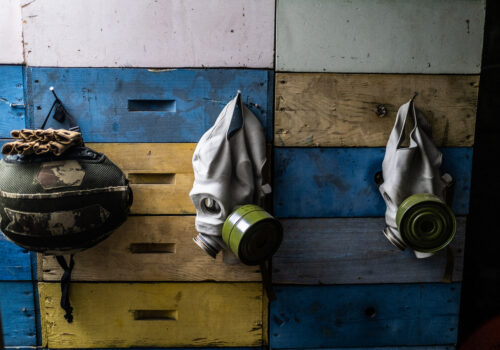Everywhere you look in Kharkiv today, there is evidence of Russian bombing. After four months of relentless aerial attacks, Ukraine’s second city is dotted with ruined buildings, while boarded-up windows have become a ubiquitous feature of the urban landscape. A little over two years ago, this had been a vibrant city known for its many universities and robust industrial economy. It is now becoming the latest symbol of the human suffering inflicted by Russia’s invasion.
There are still plenty of reminders that Kharkiv remains home to over a million people. Freshly planted flowerbeds bloom in bright spring colors. Downtown traffic is still sometimes congested, with delivery boys on bikes and scooters weaving their way through jams of taxi drivers, private cars, and public transport. Supermarkets and many small businesses remain defiantly open, while municipal workers emerge to diligently clear up the mess after each new explosion. But there is no mistaking the menace of sudden death and destruction that now hangs over the city.
Located just thirty kilometers from the Russian border, Kharkiv is Ukraine’s most vulnerable major city and has been on the front lines of the war for more than two years. Russia’s initial blitzkrieg attack on Kharkiv in early 2022 was repelled, with Ukraine’s successful September 2022 counteroffensive then pushing Putin’s invading army further away from the city. However, since the beginning of 2024, Kharkiv has become the principle target in a new Russian offensive which aims to take advantage of Ukraine’s mounting ammunition shortages and lack of air defenses.
Bombings are now a daily occurrence. Russia employs a mix of weapons including everything from ballistic missiles and drones to vast quantities of long-range glide bombs that are steadily destroying the city from a safe distance. These attacks target residential neighborhoods and critical civilian infrastructure in what appears to be a calculated campaign to make the entire city unlivable.
Stay updated
As the world watches the Russian invasion of Ukraine unfold, UkraineAlert delivers the best Atlantic Council expert insight and analysis on Ukraine twice a week directly to your inbox.
Amid the constant threat of bombing, Kharkiv residents continue to display the kind of remarkable resilience that is now synonymous with Ukraine. The city’s Makers coffee chain is a good example of this dogged determination. The chain has actually expanded since the start of the war, doubling its presence in Kharkiv from two outlets to four, while also opening a new branch in the front line city of Kupyansk. Dmytro Kabanets, the twenty nine year old owner of the chain, believes it is vital for local residents to have a sense of community. “The feeling of not being alone is invaluable. People need to know there are others ready to lend a hand, both emotionally and practically,” he says.
Despite this upbeat attitude, he admits staying in business in today’s Kharkiv is becoming more and more difficult. The windows of the chain’s flagship coffee shop are boarded up as a precaution against further bomb damage. Due to Russian attacks on the city’s energy infrastructure, electricity supplies are a major challenge for all local businesses. After both of Kharkiv’s biggest power plants were destroyed in March, the city has experienced rolling blackouts. The rumble of generators has become a background feature of everyday life, with restaurants offering “generator-friendly’ menu items that require minimal power to prepare.
Many analysts believe Russia’s objective is to depopulate Kharkiv ahead of a summer offensive that will aim to seize the city and deliver a decisive blow to Ukrainian resistance. Rumors of looming encirclement and evacuations swirl around on social media, often fueled by Russian disinformation. For now, there is no indication of a mass exodus from Kharkiv, but the strain and trauma of recent months are forcing residents to make hard decisions.
Yevhen Streltsov, who runs the city’s Radio Nakypilo, says everyone approaches the issue of whether to stay or go in a highly personal manner. Some residents are bracing themselves for a repeat of the artillery barrages that rocked Kharkiv in the first months of the war. Others say they will only leave if the city is under direct threat of Russian occupation. “The situation is tense, but there is no panic,” he says, noting that he and his team are determined to continue their mission of broadcasting to the local population.
Eurasia Center events

For some Kharkiv residents, the stress has already become too much. Exhausted and emotionally drained by months of Russian bombardment, they are heading westward to Kyiv or beyond. Many are leaving their homes for the second time, having returned to Kharkiv after initially fleeing the city in the first days of the invasion.
Inevitably, the outflow of people is having an impact on the local economy. Revenues at the Makers coffee chain have dropped by up to 40 percent in recent weeks. Across Kharkiv, companies are reluctantly shutting down as people move their families to safety, with some businesses being put up for sale. Many of the city’s public spaces now feel eerily empty, especially once evening arrives.
It is still far too early to write Kharkiv off. While more and more residents are understandably seeking to escape the horrors of daily bombing, many remain determined to stay put. The population is clearly declining, but it remains nowhere near the lows witnessed during the early months of the invasion, when only around 300,000 people remained in the city.
If Russia does launch a serious campaign to capture or encircle Kharkiv in the coming months, this would represent by far the Kremlin’s most ambitious undertaking since losing the Battle of Kyiv in early 2022. The Ukrainian army will fight hard to defend the country’s second city, and they will be supported by a still sizable local population. Given the considerable difficulties Russia has encountered in seizing much smaller towns such as Bakhmut and Avdiivka, it is far from certain that Putin’s invading army currently has the offensive capabilities to take Kharkiv.
As the summer campaigning season approaches, the threat of a humanitarian catastrophe in eastern Ukraine is rising and requires urgent international attention. Kharkiv is now the focal point of Russia’s entire invasion and is in desperate need of increased air defenses. This is the only way to prevent it from becoming the largest in a long line of Ukrainian cities reduced to rubble by the Russian military.
Maria Avdeeva is a Kharkiv-based Ukrainian security analyst and strategic communication expert.
Further reading
The views expressed in UkraineAlert are solely those of the authors and do not necessarily reflect the views of the Atlantic Council, its staff, or its supporters.

The Eurasia Center’s mission is to enhance transatlantic cooperation in promoting stability, democratic values and prosperity in Eurasia, from Eastern Europe and Turkey in the West to the Caucasus, Russia and Central Asia in the East.
Follow us on social media
and support our work
Image: A firefighter works at the scene of a fire following a Russian missile strike, Kharkiv, northeastern Ukraine. (Photo by Ukrinform/Ukrinform/Sipa USA)




